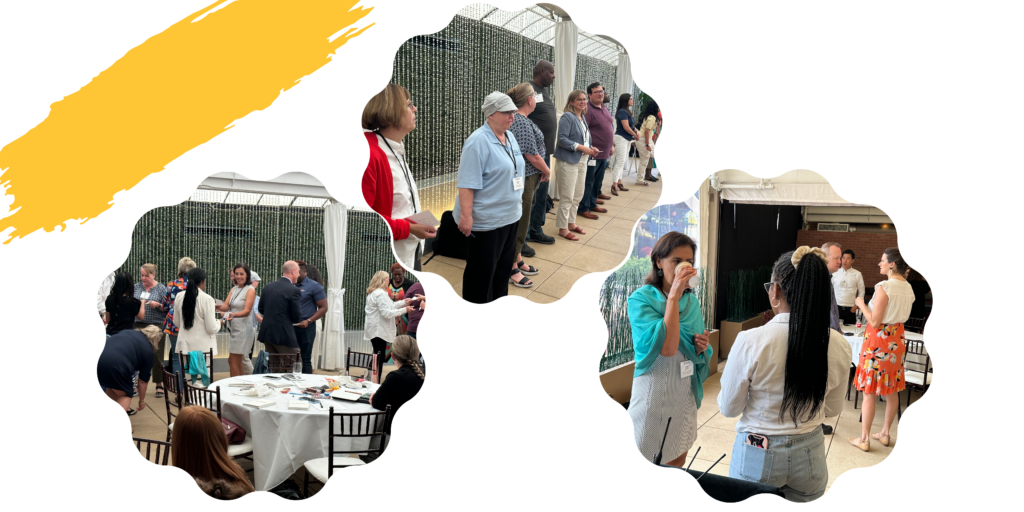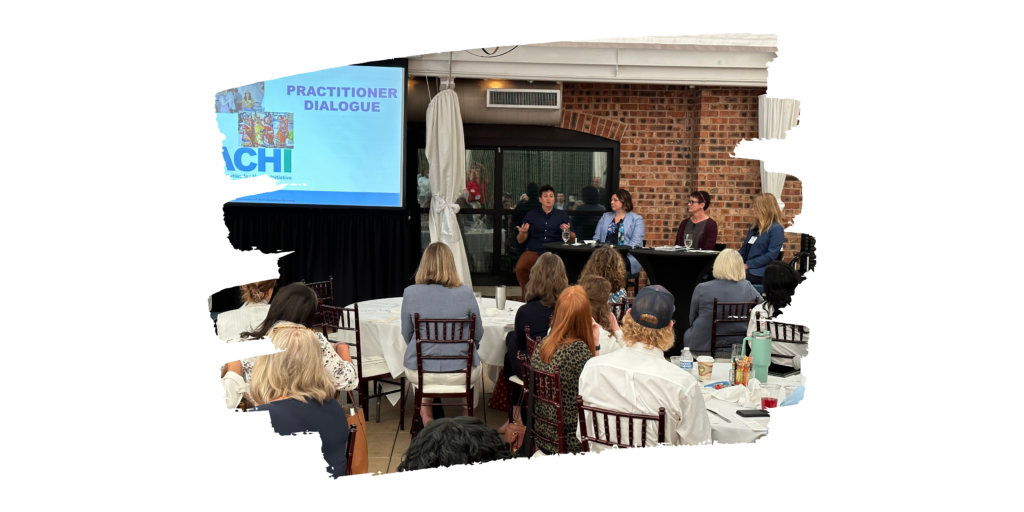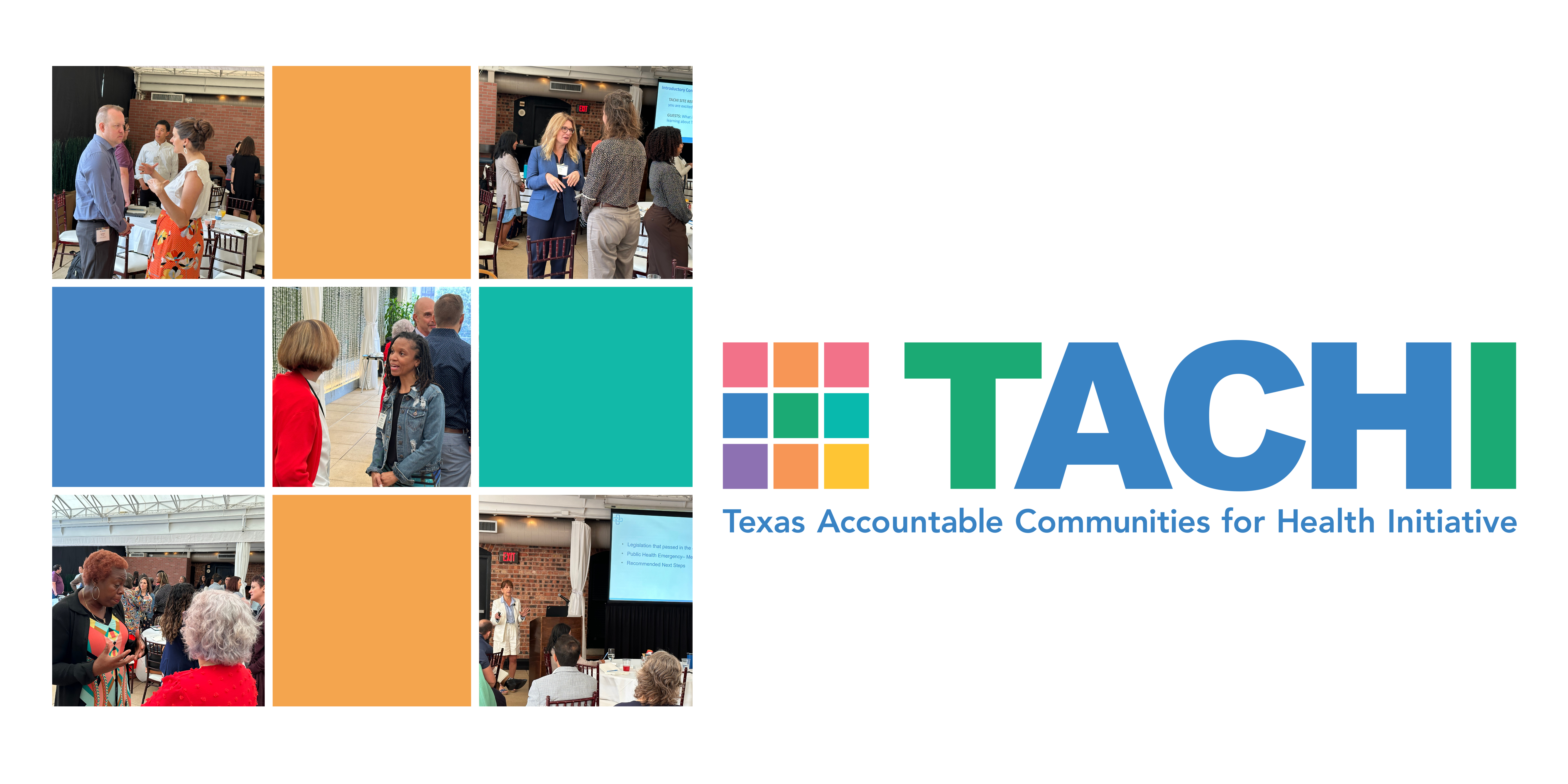The Texas Accountable Communities for Health Initiative (TACHI) offers collaboratives grant funding, technical assistance, and peer-learning opportunities around topics related to health equity, community engagement, governance, data infrastructure, strategy development, and more. The initiative aims to position collaboratives to advance community-led, financially sustainable social determinants of health (SDOH) strategies that improve health outcomes for whole communities.

On June 8, 2023, more than 70 attendees from TACHI sites, managed care organizations (MCOs), funders, and guests convened to share experiences and knowledge. As the fourth convening since the initiative’s commencement three years ago, the event highlighted the growth of the work as well as provided valuable insights for work that lies ahead. Over the course of the day, attendees heard from leaders from around the nation, participated in interactive partnership activities, cultivated relationships, and asked important questions for the future of the work. These themes drove the momentum and energy throughout the day:
- TACHI sites are finding their voice to push community-level implementation and are hungry to develop skills and knowledge to sustain the work.
- TACHI work is ecosystem work, involving communities, nonprofits, clinics, MCOs, and state and local government and policymakers. Simultaneous impact and storytelling of said impact within and among this ecosystem is critical for the sustainability of the initiative.
- Both Episcopal Health Foundation (EHF) and St. David’s Foundation’s strategic priorities charge their the ongoing commitment to the TACHI work.
TACHI Sites Foster Knowledge and Skills from Successful Practitioners
Understanding that multi-sector partnerships are key to transformational work, TACHI sites were given this unique opportunity to network, learn from, and share ideas with dynamic leaders of community-based health initiatives.
Leaders included Megan Alberston, Henry Ford Health Jackson; moderator Katherine Bailey, San Diego Wellness Collaborative; Kim Cutcher, LISC; and Celeste Schoethaler, Olympic Community of Health.

The lively panel discussion explored ways to build collaborative and successful partnerships. Each providing a unique perspective, the practitioners shared key factors for success and overcoming the challenges of this type of work:
- Building relationships, rapport, and trust is foundational to advancing system-wide, collective impact-level change.
- Employing a targeted universalism framework is an opportunity to go beyond collective impact. According to The Haas Institute for a Fair and Inclusive Society at UC Berkeley, a targeted universalism framework sets goals for an entire group and achieves these through targeted processes based on the structure, culture, and geographies of the represented groups. For TACHI, this framework could help organizations create an overarching goal for every group involved and dismantle the misalignment of power. This includes looking at where the money and power is today and asking, “how do we disrupt how money flows and where the power is?” to create equity.
- Community and resident engagement, the process of building trusting and respectful relationships with the community and ensuring resident voices are heard and engaged in the process, is different from residential leadership development, which gives residents the tools, training, and education to actively and equitably engage in planning and decision making. Investing in both is important so everyone at the table can fully and equitably participate.
- Getting uncomfortable and going to parts of your community that you don’t normally go to in order to go beyond engagement and toward building real and sustainable relationships.
- Be thoughtful: go slow in order to go fast.
- Build your voice. Say no when it doesn’t work for your community.
- Network analysis work is critical: survey tools can help measure how relationships, partnerships, and trust have changed overtime.
TACHI Sites Build Understanding and Rapport Alongside Texas MCOs
TACHI sites are met with Texas Medicaid’s complexities and nuances, implicating their relationship building and understanding of the federal program. Orienting sessions around Texas Medicaid and MCOs allows sites to build a better understanding of how Medicaid operates in Texas and the recent legislation that would impact the program.
Special learnings from sessions led by Rosie Valadez McStay and Ken Janda with Wild Blue Health Solutions and Troy Bush-DiDonato with EHF and Angie Hochhalter with Aetna are highlighted below.
Texas 88th Legislative Session
There were three significant bills with implications for TACHI sites—House Bill 12, House Bill 113, and House Bill 1575. House Bill 12 would provide 12 months coverage of Medicaid to women following a pregnancy. House Bill 1575, which was signed by the Governor on June 2 and is now law in Texas, aims to improve health outcomes for pregnant women under Medicaid by providing standardized, strengthened screening tools to determine the non-medical health needs of pregnant Texans and their babies as well as allow community health workers and doulas to be reimbursed by Medicaid. House Bill 113 defines Community Health Worker in statute and outlines specific training requirements. TACHI sites’ knowledge of and potential impact of these new laws is fundamental for long-term development and growth.
Texas Medicaid
On the federal level, due to the termination of the public health emergency on April 1, 2023, almost 5 million Texans currently covered by Medicaid must now reapply for coverage, and modeling by Health and Human Services indicates that between 750,000 to 1 million current enrollees will lose coverage over the year. Understanding how Medicaid works in Texas is critical to improving the health of communities in Texas. Reducing health disparities between low- and high-income residents includes access to care. There is an increasing recognition at a state and federal level that Medicaid needs to be better integrated with non-medical drivers of health and TACHI has an opportunity to bridge the gap with MCOs. Medicaid must do more than health care; it needs to improve the non-medical drivers of health. Ken Janda’s overview presentation can be found here.
Future impact: Legislative work has a tremendous impact on the work of TACHI. Important next steps for sites include:
- Building relationships with policy makers: write an email and call member offices to thank them for their work on these bills and explain why it’s important to TACHI.
- Ask your TACHI collaborative partners who are helping with Medicaid re-enrollment and outreach to connect with MCOs in your region and offer your assistance.
- Work with Community Health Workers.
Partnership Development: What could go wrong?
Mixed small groups of TACHI sites, MCOs, and funder representatives participated in an interactive dialogue about the potential for the good, the bad, and the ugly within partnerships. Prompts helped facilitate energetic and friendly discussions around what could go wrong in a partnership. The ideas centered around: making assumptions, failure to build trust, partnering with mal-intended funders, not representing the community, and creating a mismatch of power. From that shared space of knowing what could go wrong, the groups were challenged to reverse engineer the problems and create solutions for cultivating positive and successful partnerships. This included developing transparent partnership agreements, clearly stating mission and vision, outlining how the group was going to complete the goal, building trust, collaborating with a diverse group of cross-sector leaders, and working to identify sustainable resources.
